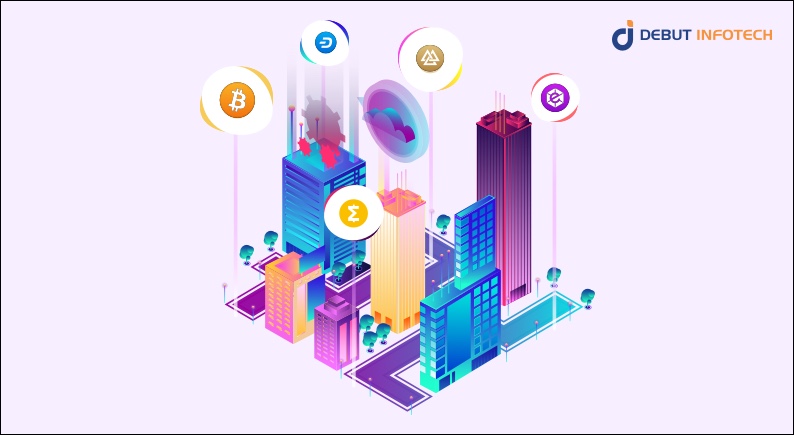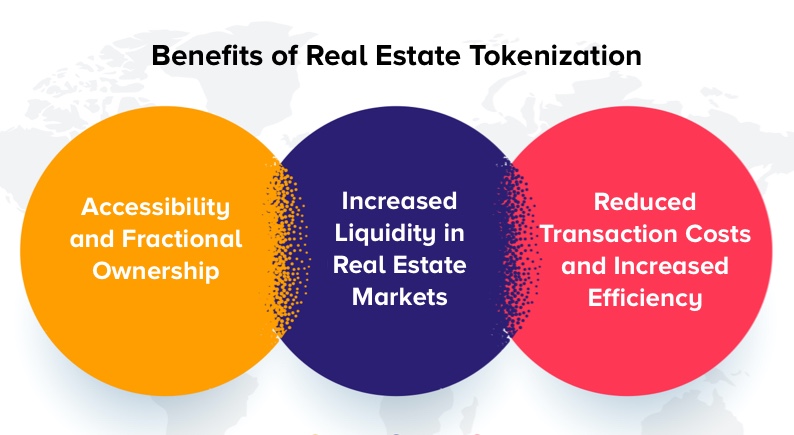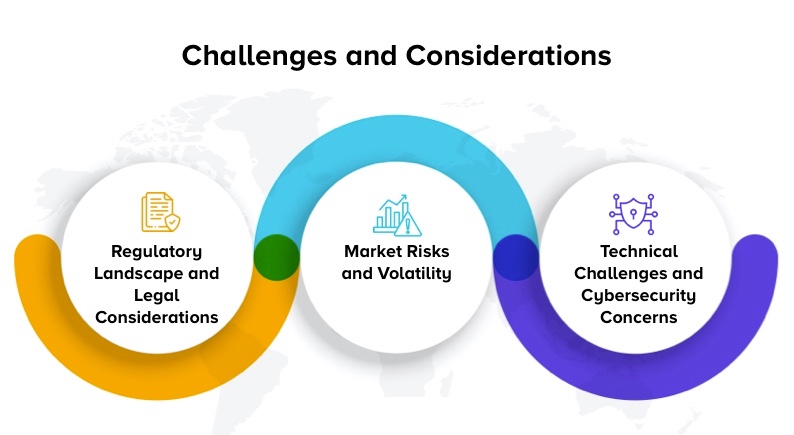Table of Contents
Home / Blog / Tokenization
What is Real Estate Tokenization?
December 15, 2023

December 15, 2023
Started in 2018, real estate tokenization is one niche of the blockchain that has not seen as much traffic over the years. However, it is now gradually gaining traction due to the discovery of its various upsides compared to traditional real estate investing. Investors are starting to see its potential in transforming the way real estate ownership and investing work. These discoveries and experiments with the tokenization of real estate have also seen the money invested into the space increase in unprecedented numbers.
According to Forbes, the market size for real estate tokenization could surge to $18.2 billion in 2032. This is miles away from its $2.7 billion valuation in 2022. This shows this niche of the blockchain might just become one of the major market movers in years to come.
This blog article will examine the essence of real estate tokenization, and its pivotal role in blockchain technology, and compare this modern method with conventional investment approaches. At the end of this, we’d have exhaustively discussed the potential of real estate tokenization in transforming property investment.
Understanding Real Estate Tokenization
As a traditional investor, understanding the basics of putting money into a digital token might seem foreign to many. Especially with the many windfalls in crypto, it might seem like an idea that is just too risky. However, it is safer than many would expect. This section explains how.
The basics of real estate tokenization involve the conversion of physical properties into digital assets or securities known as tokens. The owners of the property can decide how many tokens to be minted for a particular property and the value of each representing a part of the property. Then, these tokens can then go live on the blockchain and become tradeable.
While more technicalities go into it, this idea constitutes the bulk of the tokenization of real estate assets. With these tokens, smaller investors can then buy “parts’ of a property just the way they would purchase shares of a company. Hence, it offers leverage to investors hindered by the high barrier of entry in traditional real estate investing.
By comparison, traditional real estate investments typically involve centralized, often opaque processes, and are bound by geographic and regulatory constraints. On the other hand, digital real estate assets have faster transaction times and do not require a physical presence. Tokenization of real estate assets using blockchain, therefore, not only simplifies investment but also enhances accessibility and transparency.
The Technology Behind Tokenization
At the heart of real estate tokenization is blockchain technology. This technology acts as a backbone, providing a secure and transparent platform for managing transactions. In the blockchain, data is stored in blocks and chained together, ensuring that once a transaction is recorded, it becomes virtually tamper-proof. This security feature is vital in real estate, where the sanctity of property rights and transaction records is paramount.

Smart contracts play a significant role in this ecosystem. These are self-executing contracts with the terms of the agreement directly written into lines of code. In the context of tokenized real estate, smart contracts automate and enforce the buying, selling, or trading of tokens, reducing the need for intermediaries and streamlining processes. This automation not only cuts down on time and expenses but also minimizes human error, enhancing the efficiency of real estate transactions. Also, NFTs could serve as the certificates of ownership for these deals.
Moreover, the transparency inherent in blockchain technology instills confidence among investors. Every transaction, including past ownerships and price history of tokenized real estate, is verifiable and traceable on the blockchain. This feature addresses a critical concern in traditional real estate — the lack of transparency, often leading to disputes and fraudulent activities. Through blockchain, the tokenization of real estate assets achieves a level of security and transparency that traditional methods have struggled to provide.
Benefits of Real Estate Tokenization
Real estate tokenization is revolutionizing the property investment landscape, offering a range of benefits that address traditional market inefficiencies and open new avenues for investors. From making property investment more accessible to enhancing market liquidity, the advantages are significant and diverse. Let’s explore these benefits in detail.

1. Accessibility and Fractional Ownership
Before the advent of real-world asset tokenization, many interested investors couldn’t access some type of investment due to the high financial barriers. However, the use of tokenization brings about fractional ownership of properties, which makes real estate investments accessible to a wider audience. Also, it means investors can diversify their real estate portfolio, making it possible to own parts of various real estate assets.
2. Increased Liquidity in Real Estate Markets
One of the most transformative impacts of real-world asset tokenization is the increased liquidity it brings to the real estate market. By converting physical properties into digital assets on the blockchain, real estate can be bought and sold much like stocks or other securities. This fluidity facilitates quicker transactions, enabling investors to more easily enter and exit real estate investments, a stark contrast to the traditionally slow and cumbersome process of real estate transactions.
3. Reduced Transaction Costs and Increased Efficiency
Tokenization of real estate assets using blockchain technology significantly reduces transaction costs and increases efficiency. By streamlining the process and removing many of the traditional middlemen involved in real estate transactions, such as brokers and banks, tokenization cuts down on fees and reduces the overall cost of transactions. Additionally, the use of smart contracts automates and secures the process, further enhancing efficiency and reducing the likelihood of errors and disputes.
Challenges and Considerations of Real Estate Tokenization
While real estate tokenization offers numerous benefits, it also comes with its set of challenges and considerations. Understanding these is crucial for anyone looking to venture into this innovative investment landscape.

Regulatory Landscape and Legal Considerations
Navigating the regulatory landscape and legal considerations is a significant challenge in real estate asset tokenization. The legal frameworks governing tokenized real estate assets are still developing and can vary widely between jurisdictions. This evolving regulatory environment necessitates careful legal considerations, especially regarding property rights and compliance with financial regulations. Ensuring that tokenization practices align with existing laws and adapting to new regulations is crucial for the legitimacy and stability of tokenized real estate investments.
Market Risks and Volatility
Market risks and volatility are inherent in any investment, and tokenized real estate is no exception. While blockchain technology offers a level of security, the cryptocurrency market, often utilized for transactions in this domain, can be highly volatile. This volatility can affect the stability and predictability of investments in tokenized assets, posing a risk that investors need to be aware of and manage effectively.
Technical Challenges and Cybersecurity Concerns
Finally, technical challenges and cybersecurity concerns are crucial in the realm of real estate tokenization. The reliance on blockchain technology means that robust and secure IT infrastructures are essential. Protecting against cyber threats and ensuring the integrity and reliability of the blockchain is paramount for maintaining investor trust and safeguarding assets. Continuous vigilance and adaptation are required to mitigate these risks as technology evolves.
Real-World Examples and Case Studies
The applications of real-world asset tokenization span various sectors, showcasing its transformative potential. From real estate to fundraising and beyond, these examples underscore the versatility and impact of tokenization.
Real Estate in France
One of the most significant examples of real estate tokenization occurred in France in June 2019. A luxury property was tokenized on the Ethereum blockchain, with the ownership rights, sale conditions, and voting rights all coded into the blockchain. This process not only simplified the investment process by allowing a minimum investment as low as EUR 6.5 but also ensured transparency and efficiency. Notarial deeds and ownership certificates were encrypted and stored on the blockchain, revolutionizing the traditional property transaction process. This development highlights the practicality of tokenization of real estate assets using blockchain, setting a precedent for future real estate investments.
Legend Siam Theme Park Tokenization
In Pattaya, Thailand, a prominent example of real estate tokenization is the Legend Siam Theme Park. Spanning 65 acres and valued at $131 million, this theme park is a vibrant hub promoting Thai culture and attracting visitors worldwide. Despite its success and the presence of eight major attractions, the park is ready for further expansion and renovation.
To facilitate this growth, Legend Siam has strategically partnered with Via East West Capital for a security token offering (STO). This collaborative move aims to raise the remaining $50 million needed for the park’s development. Moreover, the innovative approach involves tokenizing 25% of the park’s equity shares, amounting to 1,000,000 shares, in exchange for the investment.
Legend Siam Theme Park’s venture into tokenization exemplifies how STOs can be effectively utilized for large-scale projects. The process not only simplifies attracting a substantial number of investors but also streamlines their management. This case underscores the versatility and practicality of tokenized real estate, particularly in managing and financing grand projects like theme parks.
Small Properties in Detroit
Generally, the price of converting real estate assets to tokens is usually a capital-intensive process, making it unadvisable for smaller properties. However, other examples show that investors can apply tokenization to smaller properties by clustering them on a single platform.
A case in point is the recent RealT project in Detroit. In this, a property located at 5846 Crane St was successfully tokenized, raising $148,890. The investment return for this property was projected at an attractive 11.73%. This is just one among several instances where properties with values as modest as $50,000 or $100,000 are being effectively tokenized. The key to making these projects feasible is leveraging economies of scale. By grouping multiple small properties on a unified tokenization platform, the cost per object is significantly reduced. Making the investment attractive and accessible to a broader range of investors.
Case Study: Her Majesty Land Registry (HMLR) Real Estate Tokenization in the U.K.
Background
Her Majesty’s Land Registry, a pivotal UK government department responsible for managing over 25 million property titles, has strategically partnered with ConsenSys Codefi to innovate the real estate market. This forward-thinking collaboration aims to enhance the speed, simplicity, and transparency of real estate transactions by leveraging blockchain and smart contract technology. As part of HM Land Registry’s Digital Street R&D Project, the initiative involves creating a digital token to represent property ownership, thereby mirroring the processes and behavior of traditional real property transactions.
The Pain Points
The real estate investment industry faces several challenges, including:
- Cumbersome Investor Registry Maintenance: Traditional systems are costly and complex.
- High Investment Minimums: This leads to limited investor numbers, expensive assets, and price fluctuations based on market demand.
- Fragmented Transaction Processes: Transactions require multiple parties and intermediaries, which increases both the cost and complexity.
- Isolated Secondary Markets: Reliance on manual processing hampers efficiency.
- Low Transparency Levels: This lack of clarity creates trust issues in transactions.
The Solution: Title Token
The solution involved a prototype “Title Token” representing property shares, issued on Codefi’s digital asset marketplace. The process entailed:
- Token Request: Property owners request Title Tokens, representing their real-world assets. These tokens are akin to traditional title deeds.
- Identity Verification: Owners log in via MetaMask and verify their identity.
- Token Transfer: After verification, HMLR transfers the Title Token to the owner’s wallet.
- Security Token Creation: Owners create security tokens linked to their Title Token on Codefi Assets.
- Token Specification: Owners decide on the number of tokens, pricing, and total offering amount.
- Marketplace Launch: The security tokens are then launched for trading on Codefi’s digital marketplace.
- Investor Management: Investors manage portfolios, view offerings, access asset data, and engage in trading.
- Regulatory Oversight: Regulators can view token data and monitor on-chain activities, including trades.
The Results
Codefi’s solution enabled HMLR to demonstrate that blockchain technology could significantly benefit the real estate sector by:
- Reducing Costs: Streamlining processes and reducing overheads.
- Speeding up Verification: Quicker identity and document verification.
- Customization Flexibility: Tailoring products to specific needs.
- Expanding Market Access: Allowing fractional property ownership, opening the market to those unable to afford entire properties.
- Provenance Assurance: Providing trusted evidence of asset origin and history.
How to Get Started with Real Estate Tokenization
Embarking on real estate tokenization can be a transformative journey for both investors and property owners. To successfully navigate this innovative field, it’s important to follow certain key steps and consider practical advice. These strategies will help ensure a seamless transition into the world of tokenized real estate, opening up new opportunities for growth and investment.
For investors keen on tokenized real estate assets:
- Educate Yourself: First and the foremost, you must understand the basics of blockchain asset tokenization. So, familiarize yourself with how these technologies intersect with real estate.
- Research Platforms: Secondly, Look for platforms that specialize in real estate tokenization. These platforms should offer a range of properties and have a robust security infrastructure.
- Evaluate Investment Opportunities: Further assess the properties available for tokenization, considering factors like location, value, and potential ROI.
- Consult Legal and Financial Advisors: Understand the regulatory and tax implications of investing in tokenized real estate.
For real estate owners looking to tokenize their assets:
- Valuation and Legal Compliance: Have a professional evaluate your property and make sure you comply with local real estate laws.
- Choose a Tokenization Platform: Partner with a reliable platform that can handle the technical aspects of tokenization.
- Structure Your Offering: Decide on the structure of your token offering, including both number of tokens and their price.
- Marketing and Sales: Develop a strategy to market your tokenized property to potential investors.
The Future of Real Estate Tokenization
As we look toward the horizon of real estate tokenization, it’s clear that this innovation is more than just a fleeting trend. However, It’s a significant shift, promising to redefine the norms of property investment and ownership. In this evolving landscape, the role of specialized expertise and advanced technological solutions becomes paramount.
At Debut Infotech, we understand this and have positioned ourselves as a leading real estate tokenization company at the forefront of this digital revolution. With a deep understanding of blockchain technology and its applications, Debut Infotech offers a wide array of services, including the development of decentralized applications (dApps), the crafting of intricate smart contracts, and the provision of bespoke blockchain solutions tailored to the unique needs of each client. Furthermore, our expertise extends beyond real estate tokenization and encompasses various sectors where blockchain can create a significant impact.
Whether you are an investor curious about the prospects of tokenized real estate, a property owner considering tokenizing your asset, or a business looking to integrate blockchain into your operations, Debut Infotech’s expert blockchain consultants are equipped to guide you through every step of the process. Additionally, they provide insights, strategy, and technical support to navigate this complex yet exciting domain.
FAQ’s
Q: What is real estate tokenization and how does it work?
A: In the Real estate tokenization process, It converts property rights into digital tokens on a blockchain. However, these tokens represent a share in the real estate asset, making it easier to buy, sell, or trade.
Q: How does tokenization differ from traditional real estate investment?
A. Unlike traditional investments, tokenization allows for fractional ownership, increased liquidity, and streamlined transactions, making real estate investment more accessible and efficient.
Q: What are the primary benefits of tokenizing real estate assets?
A: The benefits of real estate tokenization include increased liquidity, enabling easier asset trading, fractional ownership, allowing more flexible investment opportunities, as well as lower barriers to entry for a wider range of investors. Additionally, this approach enhances transparency and efficiency in transactions, streamlining the entire process for all parties involved.
Q: Are there any risks associated with real estate tokenization?
A: Yes, real estate tokenization comes with risks, including regulatory uncertainty, potential security vulnerabilities, and market volatility. Evolving legal frameworks may also pose challenges for both investors and property owners.
Q: How does blockchain technology ensure the security of tokenized properties?
A: Blockchain provides a highly secure and transparent ledger where all transactions are immutably recorded, significantly reducing the risk of fraud and minimizing errors throughout the process.
Q: What legal considerations should you take into account in real estate tokenization?
A: Legal considerations in real estate tokenization include ensuring full compliance with property laws, strictly adhering to securities regulations, and thoroughly understanding the tax implications associated with these transactions.
Q: Can small investors participate in real estate tokenization?
A: Yes, one of the key advantages of tokenization is that it allows small investors to participate in the real estate market through fractional ownership.
Q: How does one buy or invest in tokenized real estate?
A: Investments can be made through platforms specializing in real estate tokenization, using both digital wallets and cryptocurrencies.
Q: What is the future outlook for real estate tokenization?
A: The future is promising, with expectations of wider adoption, technological advancements, and more regulatory clarity.
Q: How do regulations govern tokenized real estate assets?
A: Regulations vary by region and are evolving, but generally, they involve securities laws and real estate regulations.
Talk With Our Expert
USA
Debut Infotech Global Services LLC
2102 Linden LN, Palatine, IL 60067
+1-708-515-4004
info@debutinfotech.com
UK
Debut Infotech Pvt Ltd
7 Pound Close, Yarnton, Oxfordshire, OX51QG
+44-770-304-0079
info@debutinfotech.com
Canada
Debut Infotech Pvt Ltd
326 Parkvale Drive, Kitchener, ON N2R1Y7
+1-708-515-4004
info@debutinfotech.com
INDIA
Debut Infotech Pvt Ltd
Sector 101-A, Plot No: I-42, IT City Rd, JLPL Industrial Area, Mohali, PB 140306
9888402396
info@debutinfotech.com



Leave a Comment